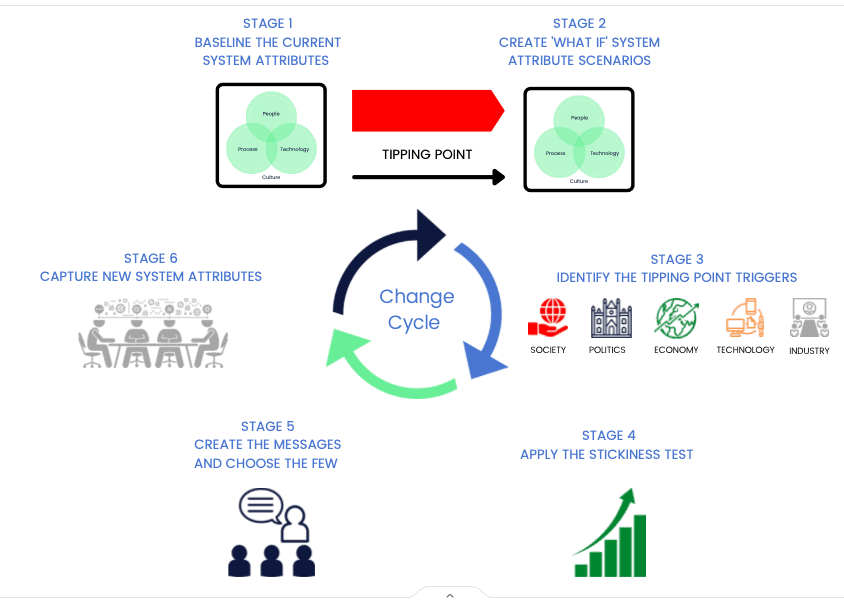The Williams-Shapps Plan for Rail is a welcome step forward for the rail industry and provides a platform for transformational change – but delivering its vision and intent will not be easy. The challenge will be complex, but with purpose and determination the system can change.
Our first Interimconsult paper describes the complexity of the challenge and how it might be addressed – the first step being to recognise that the railway is both in reality and in terms of a formal definition, a complex system. The importance of adopting this mindset cannot be overstated – recognising the railway as complex, not just complicated, highlights the need to change its culture. It brings a new perspective on how to deliver transformational change that sticks – and the significance of tipping points that can irreversibly change the industry and its culture for the better.
Changing complex systems requires diverse thinking. This means there is still tremendous value to be added by people from within the industry, but that it must be complemented by contributions from different people, industries and disciplines. The recurring themes in the Plan for
Rail cannot be addressed by rail industry expertise alone. New connections must be identified to ‘join the dots’ to make sure that past failures to deliver reform, despite the best intentions of those in the industry, are not repeated. New perspectives on what makes a great customer experience, not a great railway, is the type of ‘system reframing’ needed to tackle complex change.
Transformation in complex environments is a continuous journey. The rail landscape is constantly ‘dancing’ and cannot be controlled, but a single guiding mind can set the course. A loss of command and control may be hard to accept – in reality it is the interaction of people, process, technology and culture on a moment-by-moment basis that affects industry outcomes and the pace of change. Currently, change is far too slow and opportunities afforded by proven and readily available technologies take decades to enter the rail industry. The industry’s complexity is often used as an excuse for slow evolution but can in fact be used to facilitate rapid and irreversible positive change through the creation of tipping points. History tells us this is the case.
Identifying Tipping Point Enablers
- Recognise complexity – identify what creates complexity and what does not. What is most predictable and can be controlled and what is unpredictable and cannot be controlled.
- Encourage diversity of thought – promote engagement to provide new perspectives, spot errors and flaws in thinking, challenge existing constraints, identify metaphors and give new insights.
- Understand the landscape and how it continually changes – explore interdependencies, connections and synergies between the system’s people, processes, technology and culture.
- Identify the system attributes that matter – understand those that are resistant to change or can be leveraged and why, then capture them ‘as-is’.
- Develop ‘tipping point scenarios’ that change the system attributes – using the framework of people, process, technology and culture informed by diverse thinking, identify the means for changing system attributes and avoiding over-analysis and command and control influences.
System Reframing
Looking at the interaction of people, process, technology and culture and the history of the rail industry and innovation leads to an obvious conclusion:
Change that ‘sticks’ needs tipping points
Identifying tipping points requires ‘system reframing’. The challenge is to select those tipping points that turn concepts and ideas into behaviours and ways of working that make a positive impact, and support the successful development of new value-adding products and services.
Despite the many instances of lost opportunities, slow adoption and resistance to change, system reframing can be used to identify swift action, with transformational impact – overcoming the long-held belief that change must take time.
The System Reframing Process

So What?
So is transformational change in the rail industry possible?
The answer is yes – but to fulfil the seven promises in the Plan for Rail needs more than just structural change.
Our Interimconsult Insights paper shows how the ingredients that have led to past shortcomings in the rail industry can be changed, creating an environment to join the dots, break down silos, encourage diversity of thought and develop a new sense of purpose about why the railway matters.
The railway can be part of re-engineering the economy – but its innate complexity and culture amplify the challenge of change to achieve this goal. Everyone who works in the industry knows more can be done on a moment-by-moment, day-by-day basis, despite their best efforts and many successes. The challenge is not unique to rail and the premise of this paper about making complex change can be more widely applied to other industries, businesses and teams.
To build back better, achieve net-zero and increase affordability means we cannot carry on as we are. We need to create tipping points that bring about irreversible and positive change.
Additional Information
Tipping points can help make transformational change in your industry, business and teams
Does change need to happen fast?
Does change need to stick?
Do you know your tipping points?
Would you like to find out more?
Interimconsult can help you address the challenge of complex systems change at an industry, business and team level.
We can also help accelerate the pace and success of change that sticks and would be delighted to hear from you so please contact: paul@interimconsult.co.uk




